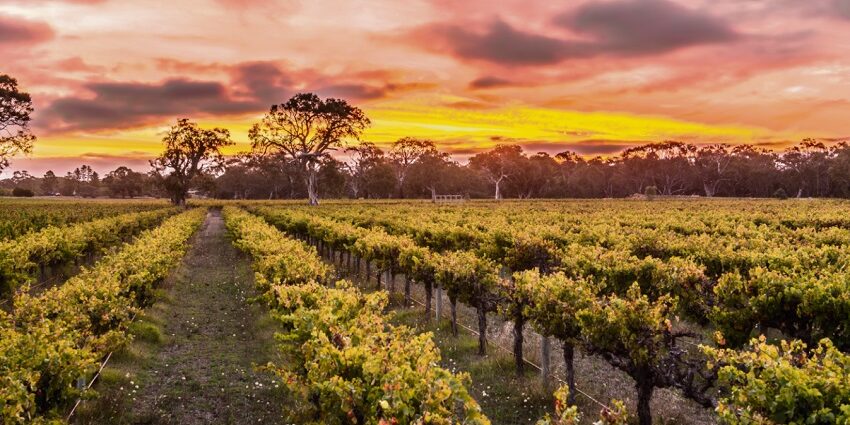Case Study: Water Treatment for Winery at Langhorne Creek in South Australia.
The Langhorne Creek region is situated some 80km to the south east of Adelaide on the alluvial plains between the Mount Lofty Ranges and Lake Alexandrina. Whilst this region has been producing winegrapes for over 150 years, viticulture has until recently been confined to the flood plains of the Bremer and Angus Rivers which drain into Lake Alexandrina. Over the past 10-15 years however, there has been a dramatic expansion of vineyards in the region, increasing plantings from only about 500 ha in 1985 to in excess of 4,000 ha today. This dramatic expansion has been fueled by the growth in Australian wine exports and specifically by the water availability from the Lake. The region has a typically dry climate, with an average rainfall of less than 400mm, hence additional water is essential for vineyards to prosper on soils off the alluvial floodplain.
As a result of drought the flow into Lake Alexandrina has been negligible and the level of the Lake has fallen steadily since 2006. In 2008, water levels in Lake Alexandrina and the connected Lake Albert became so low that large quantities of acid sulphate soils threatened to form. The soils on the lake beds are naturally rich in iron sulphides. When exposed to the air, such as may occur in a time of severe drought, the sulphides oxidize, producing sulphuric acid. The barrages now prevent seawater inflows that have prevented these phenomena in every drought since the last ice age. As the level of Lake Alexandrina has fallen, the salinity of the remaining water has increased and by spring 2007 was high enough to cause long term impacts when used for irrigation. Water Treatment for Winery
A group of Langhorne Creek, South Australia producers have become the first to make the waters of Lake Alexandria usable for irrigation at two local vinyeards and one local turf farm. Lake Alexandria is renowned to be brackish salty water also containing colloidal and insoluble iron. Prior to the 2 million dollar desalination was commissioned by International Company Biosystems Group, business growers such as Kirribilly Viticulture, Lawsim Vinyards and Borman Turf all were relying on iron contaminated, salty lake or bore water to irrigate their vineyards and lawn farms. The salt and iron would inhibit the growth of plants and block irrigation lines.
Construction of Plant (Water Treatment for Winery)
The plant’s construction was designed by BioSystems Group despite growers being told desalinating the turbid, brackish and iron contaminated water was not possible because it was too contaminated with silt. However water is pumped from Lake Alexandria, and treated through a series of BioSystems clarifiers and sand filters to remove silt and reduce turbidity. One of the final filter treatments, prior to the reverse osmosis (RO) treatement, DMI-65 is used to remove traces of colloidal and insoluble iron that may create nuisance bio fouling and clogging of the RO membranes, and down stream irrigation systems, drip feeders and sprinklers.
Unlike ion exchange resins where higher regenerant dosages will increase the ion exchange capacity, NaOCl residuals or concentrations higher than required to oxidize the Fe and Mn do not increase the oxidative properties of the media. Additionally, since the media is often used to pretreat waters prior to an RO system a higher free chlorine residual would require more extensive post treatment to reduce the residual and protect the membranes from chlorine attack.
BioSystems is a Multi-National Company with over 25 years’ experience in the field of Water and Waste Water Treatment. The core business of Biosystems is supplying integrated water treatment solutions for large and small scale projects through the application of leading water treatment technologies. Biosystems designs, constructs and manages advanced waste water treatment plants as well as providing a range of Water purification products and services to support widely diversified global clients.
The success of the project has secured future (water filtration winery) of the three business by securing up to 3 megalitres per day of high quality purified water to hundreds of hectares of vineyards and turf farms. Helping to improve the soil condition of the local environment and also the productivity of the vines and lawn farm. In turn securing the jobs and lively hoods of the people who own, work use the water provided by the desal plant at Lake Alexandria.
For more case studies similar to ‘water filtration winery’ please get in contact


















